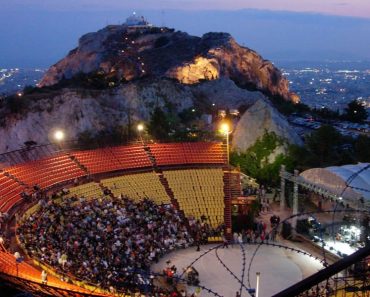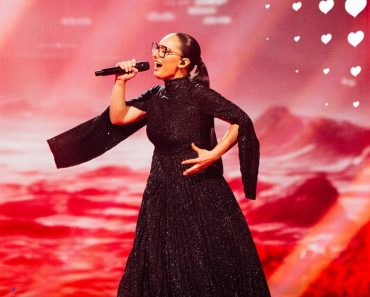From Marinella’s debut in 1974 to Marina Satti’s “ZARI” in 2024, Greece’s journey in Europe’s most extravagant music competition has been anything but dull. Get ready for a crash course in the country’s most iconic moments, hilarious scandals, unforgettable fashion statements, and the highs and lows that made Greece stand out every year.
Let’s dive into the good, the bad, and the fabulously dramatic chapters of Greece at Eurovision. “Good luck, Greece!”
1974: The First Step – With a Dose of Scandal
Greece made its Eurovision debut in 1974 with Marinella singing “Krasi, Thalassa Kai T’ Agori Mou” (“Wine, the Sea, and My Boy”). Originally, the rock band Nostradamos had been selected, but they were pulled out under controversial circumstances.
Why? During a tour in Northern Greece, the band’s lead singer, Ippokratis “Charlie” Exarchopoulos, and their sound engineer were arrested in Thessaloniki on charges related to the seduction of a minor. The scandal dominated headlines, the band was disqualified, and Marinella stepped in as a last-minute replacement.
But the drama didn’t end there. Prominent Greek composers—including Giorgos Hatzinasios and Loukianos Kilaidonis—sent a letter of protest to the national broadcaster ERT, claiming they were never informed of a competition to select the Eurovision entry.
Ultimately, Marinella placed 11th. Sweden’s ABBA took the crown with “Waterloo”, which became the most iconic Eurovision performance of all time.
1977: Greece Breaks Into the Top 5
Greece returned in 1977 with a bang. The quartet of Pacalis, Marianna, Robert, and Bessy performed “Mathima Solfege”—a playful song about learning music theory. It remains one of the most iconic Greek Eurovision entries. Judges were impressed, and Greece achieved its best result to date: 5th place.
1982: Scandal Strikes Again
In 1982, Themis Adamantidis was set to perform “Sarandapente Kopelies” (“Forty-Five Girls”), but the song had already been released—an explicit violation of Eurovision rules requiring entries to be unpublished.
Greece was forced to withdraw and pay a fine. The country remained absent from the contest until 1987 (except for a planned 1986 return with Polina, which was scrapped because the final coincided with Holy Saturday—a no-go for Greek scheduling).
1991: The Saxophonist That Ruined Everything
Sophia Vossou’s “I Anixi” (“Spring”) was a strong favorite, with a powerful vocal and high expectations. But disaster struck: the saxophonist—crucial to the musical climax—fell ill right before the show.
He was hastily replaced by a 70-year-old retired musician who, despite his charm, simply couldn’t deliver the demanding solo. The result? Missed notes, lack of energy, and a dramatic drop to 13th place.
Despite the setback, “I Anixi” remains beloved in Greece, considered timeless by fans.
1993: The Dress, the Drama, and a Record
Kaiti Garbi stunned Europe with “Ellada, Chora Tou Fotos” (“Greece, Land of Light”) and placed 9th. But what truly made headlines? Her scandalously revealing dress by Celia Kritharioti, which had viewers questioning if she was even wearing underwear.
It’s arguably the most iconic dress in Eurovision history.
Garbi also holds the record for the longest uninterrupted camera shot in Eurovision history—43 seconds without a single cut.
2001: Antique Brings Greece into the Top 3
The duo Antique—featuring 19-year-old Elena Paparizou and Nikos Panagiotidis—performed “Die for You” and secured 3rd place, marking Greece’s best-ever result at the time and signaling the start of its golden Eurovision era.
2004: SAAAKIIISSS!
Sakis Rouvas turned up the heat with “Shake It”, landing another 3rd place finish. Shirtless moments, striptease vibes, backflips, and peak sex appeal—this was Greece at its most Eurovision-y.
2005: My Number One – Greece Reaches the Top
Elena Paparizou returned solo with “My Number One”—and on the day of her name day, no less—and brought Greece its first-ever Eurovision victory.
She earned ten 12-point scores, tying the record held by Katrina and the Waves’ “Love Shine a Light”. The song topped charts in Greece, Cyprus, and Sweden and cracked the top 10 in several European countries, even reaching the Billboard Dance Chart in the U.S.
Her Swarovski-studded Roberto Cavalli dress became part of Eurovision legend.
In the 2005 Congratulations special celebrating Eurovision’s 50th anniversary, “My Number One” ranked 4th most popular song of all time—behind only “Hold Me Now”, “Volare”, and “Waterloo”.
2006: The Diva Returns
Hosting the contest in Athens, Greece was represented by Anna Vissi, one of its biggest stars, singing “Everything”. Despite her powerhouse status, she only placed 9th—a result considered disappointing at the time (though we’d later long for such “flops”).
2007: “Yassou Maria!”
Greece chose Sarbel’s “Yassou Maria” via a national final, where he beat out Tamta and Christos Dantis. Though some criticized the performance as overly sexualized (dancers pulling scarves from their skirts), the song was catchy and placed 7th. It became a favorite in Euroclubs—especially in Scandinavia.
2008: Kalomira’s Secret Book Moment
Kalomira’s “Secret Combination” was Greece’s entry in 2008 and earned 3rd place. There was tension over whether the director would properly showcase a key part of the choreography—a dramatic book-opening moment. Thankfully, it went smoothly and thrilled audiences.
Fun fact: Kalomira went on a promo tour through Azerbaijan, Romania, and Serbia, funded in part by Jennifer Lopez, who was launching a fashion line in Europe.
2009: Greece Realizes It Might Never Win Again
Sakis Rouvas returned with “This Is Our Night”—but it wasn’t. Greece had high hopes and was a betting favorite, but Europe wasn’t convinced. The song landed in 7th place, and disappointment was palpable.
Afterward, Sakis famously told reporters to “drink his blood,” expressing his frustration. It marked a turning point: no more superstar names, less investment, and a slow fade from Eurovision glory.
2010–2013: Low Budget, High Results
Despite the economic crisis, Greece still managed solid placements.
- 2010: Giorgos Alkaios with “OPA” – 8th
- 2011: Loukas Yorkas & Stereo Mike with “Watch My Dance” – 7th
- 2013: Koza Mostra & Agathonas with “Alcohol is Free” – 6th (4th in the public vote!)
Exception: 2012’s “Aphrodisiac” by Eleftheria Eleftheriou, which flopped.
2014–2019: A Dark Era
This was Eurovision’s “dark age” for Greece.
- 2014: Freaky Fortune & RiskyKidd – “Rise Up”, 20th
- 2015: Maria Elena Kyriakou – “One Last Breath”, 19th
- 2016: Argo – “Utopian Land” → First time Greece failed to qualify
- 2017: Demy – “This Is Love”, 19th
- 2018: Yianna Terzi – “Oniro Mou” → failed to qualify again
- 2019: Katerine Duska – “Better Love”, 21st (Greece’s worst ever result)
The magic seemed gone.
2020–2022: A Pandemic and a Comeback
- 2020: Contest canceled due to COVID-19
- 2021: Stefania – “Last Dance”, 10th across the board (jury, televote, and final result!)
- 2022: Amanda Tenfjord – “Die Together”, 8th
Signs of life returned.
2024: Marina Satti and “ZARI” – Hopes Dashed Again
After years, Greece sent a major artist: Marina Satti. Hopes were high for “ZARI”, but on the day of the final, she came down with pharyngitis. Despite everyone’s online efforts to ward off the bad vibes, things didn’t go as planned.
Result? Another year outside the top 10—and another bitter pill for Greek Eurovision fans.







